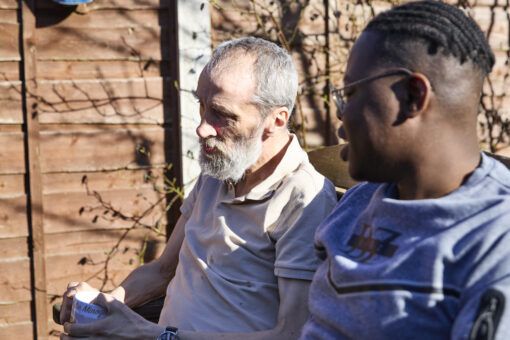
Early Life
Ronnie grew up with his mum, dad, brother, and sister. He attended mainstream school until additional learning needs were identified. Ronnie described his school life as average, but he often avoided attending by pretending to be unwell.
As he grew older, life at home became more difficult. His family found some of his behaviours hard to handle, and eventually, Ronnie was asked to leave. For a time, he slept rough, leaving him vulnerable and uncertain about the future.
Gaining independence
Eventually, Ronnie secured his own flat – a big step towards independence. However, he became vulnerable to others who took advantage of his kindness, using his home for their own purposes. During this time, he had several contacts with the police, which led to his arrest and hospital detention under sections 37/41 of the Mental Health Act.
Ronnie spent nine years in the hospital. During that time, he worked closely with professionals to understand the effects of alcohol and to create a relapse prevention plan. Alcohol misuse had been a factor in his offence, and one of his conditions was to remain abstinent. These years became a turning point, helping Ronnie gain insight, stability, and a clearer sense of purpose.
Building confidence after hospital
When Ronnie left the hospital, he received full-time one-to-one support and with support colleagues by his side at all times as he began to rebuild his life. Although this level of support was not a legal requirement, Ronnie preferred having his colleagues nearby as he adjusted to independent living.
Gradually, he began to explore more of his surroundings, attending concerts, visiting local shops, and keeping in touch with a close friend from the hospital. As he developed trusting relationships with his support colleagues, Ronnie’s confidence grew. Over time, he began going out alone, knowing help was there if needed.
With encouragement from his multidisciplinary team (MDT), Ronnie decided to begin reducing his support package, marking a major milestone in his journey.
Personal growth and progress
Through focused sessions with his Clinical Practitioner, Ronnie explored friendships and relationships. This work helped him recognise negative influences in his life and make positive choices about who to spend time with.
He also overcame day-to-day challenges. For example, he initially found the breathalyser tests he was required to take frustrating when they occasionally failed due to technique. By sharing these frustrations with his support colleagues, a solution was found, and Ronnie can now complete the tests confidently every time. It was a small but powerful example of how communication and trust can lead to progress.
Finding purpose through work
As Ronnie’s support decreased by about 20%, he started to notice gaps in his routine. Instead of letting boredom take over, he used it as motivation to keep moving forward. Ronnie decided it was time to find meaningful, paid work.
He is now employed as an Expert by Experience, contributing to interview panels and co-facilitating training for colleagues. Ronnie mainly works from home but also travels across the country to share his insights and experiences – using his story to inspire others and shape better care.
Looking ahead
Ronnie remains on a conditional discharge and continues to build evidence for an absolute discharge by consistently meeting his conditions. At one stage, he had planned to drink alcohol again once restrictions were lifted. With reflection and maturity, Ronnie now recognises how far he has come and the value of maintaining the life he has built. He has made the decision to remain alcohol-free for good.
Ronnie continues to see his mum weekly and regularly visits his long-term friend, whom he describes as a “true friend” – someone who encourages him to stay on track and keep growing.
Today, Ronnie’s support package has reduced from full-time (112 hours with sleep-in support) to around 80% of that level, with further reductions under discussion. His journey is a powerful example of how consistent support, trust, and determination can transform a life, turning challenges into achievements and dependence into self-belief.
